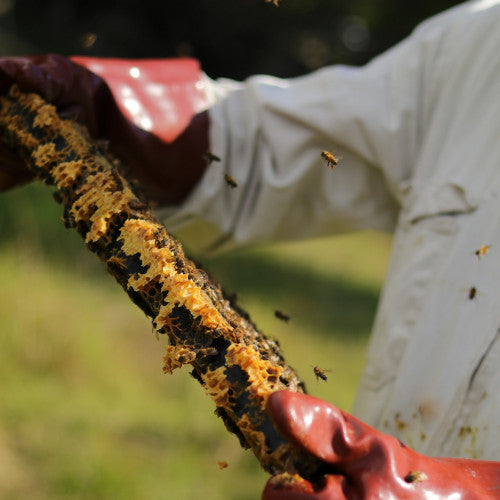Bee populations are dying out. We have all seen the headlines and heard the soundbites for decades, and yet very few of us have been motivated to do anything about it. Maybe it’s because we don’t like getting stung. Or maybe our children are so afraid of bees that we think having a few less of them around might actually be ok. But if we did a better job at filling in the knowledge gaps between how bee populations directly influence the foods we eat at every meal, or gave our local communities a better understanding of how a collapse of bee populations would lead to a collapse of our economy, then we might have a better chance of motivating society to support businesses and business practices that in turn support and protect our fuzzy, buzzy striped friends.
According to the USGS there are over 20,000 species of bees. Four thousand species of bees are native to the United States. And yet just one of those types, the honey bee, contributes to over 15 billion dollars to the US economy through its role in pollinating fruits, nuts and vegetables. Some estimates put the global economic value on bee reliant food production at $577 billion dollars! Sure there are other pollinators, but the majority of our crops are almost exclusively pollinated by bees. In the US alone there are over 90 crops exclusively pollinated by bees. To name only a few examples – production of blueberries, squash, and watermelon would collapse if our bee populations disappeared – so would South America’s ability to produce chocolate. No chocolate? That should be reason enough to change our habits and learn to support our bee populations.
Over the last six decades, honey bee colonies in the United States have declined from 6 million to just over 2.5 million today. A lot of ink has been spilled over the impact chemical fertilizers and pesticides have had in reducing our bee populations. And yes, those environmentally damaging products have absolutely had a huge role in the decline of our bee colonies. But another more important factor is often overlooked or under-reported, it is the way in which we have chosen to grow our food. Loss of plant diversity is the primary cause of bee decline. Unfortunately, as the Monsantos of the world have taken over food production, the biodiversity of our crops has suffered tremendously as well. Single strains of strawberries, of corn, or of apples, now dominate entire fields for miles and miles. Almost 50% of native bees are highly specialized – meaning that they exist to pollinate a specific type of a specific plant. So as those smaller subspecies of our fruits and vegetables are eliminated, so too are the bees that pollinated them. And once those bees die out – our ability to grow those plants also disappears.
Knowing that bees are contributing billions of dollars to our economy and are directly responsible for the plants we eat everyday, makes it crucial to consider ways in which we can help stop their rapid disappearance from our planet. Supporting small local farms and businesses whose products impact and are impacted by bees is a great way to start. The most obvious example to understand the benefit of this approach is of course honey. We are all familiar with the plastic honey bear filled with “honey” we see at our local grocery stores. But this mass produced substance has little resemblance to the golden, delicious products you’ll find at a local farmers market. Local bee populations who have made their honey after pollinating native plants will produce intensely flavorful honeys that differ wildly depending on local flora. From clover honey to dandelion honey to the more rare types like avocado honey or pine tree honey – seeking out these different products can help support diversity in plants while simultaneously helping to bolster our bee populations.
But honey isn’t the only product we get from bees. Royal jelly, bee pollen, and bee propolis are all touted as dietary supplements with a wide range of benefits, and like honey – these benefits and the quality of the product can be directly impacted by the type of bees doing the pollinating. Take the bee propolis produced by Beehive Botanicals as an example. Bee propolis is a resin-like substance bees create by mixing their beeswax with the sap and buds of local trees. Bees use propolis to patch holes and cracks in their nests or hives. Bee propolis is sometimes referred to as ‘bee glue’.
Knowing that the continued decline of bee populations will mean an inability to grow the foods we eat while inflicting billions of dollars in damage to our global economy – it’s clear that finding a way to protect our insect friends is an issue that needs our immediate attention. Supporting local businesses like Beehive Botanicals, is a great way to get started.
For more information about Beehive Botanicals’ bee propolis, bee pollen, and royal jelly retail products please visit www.beehivebotanicals.com or give us a call at 800-223-4483.

